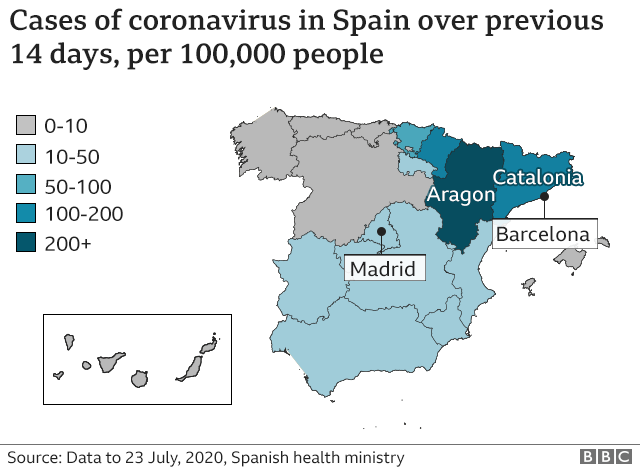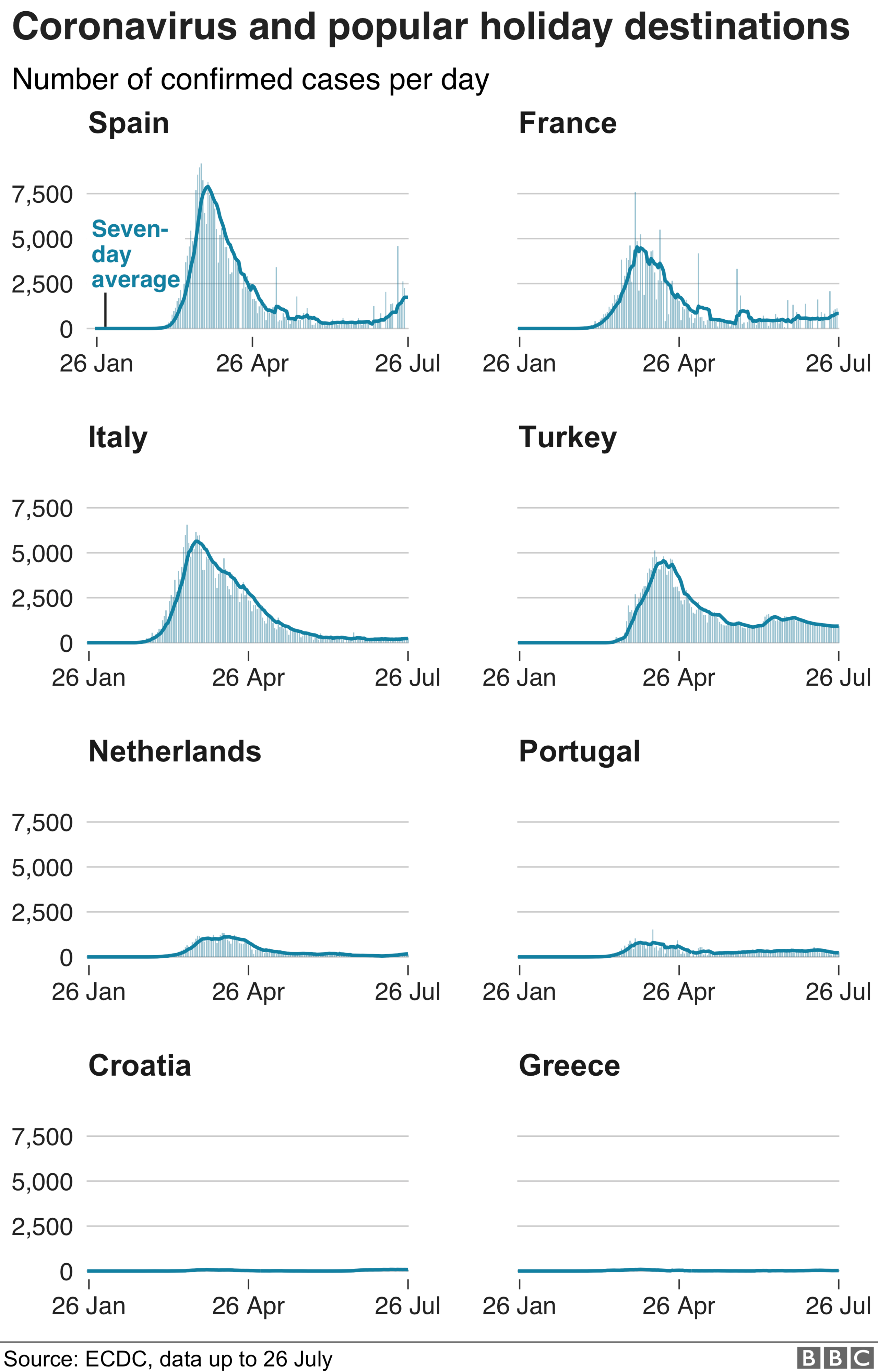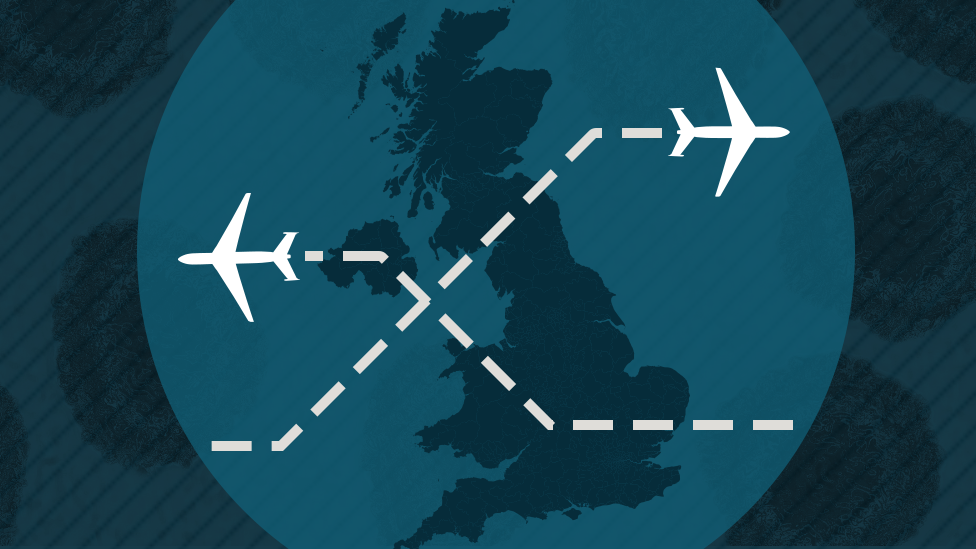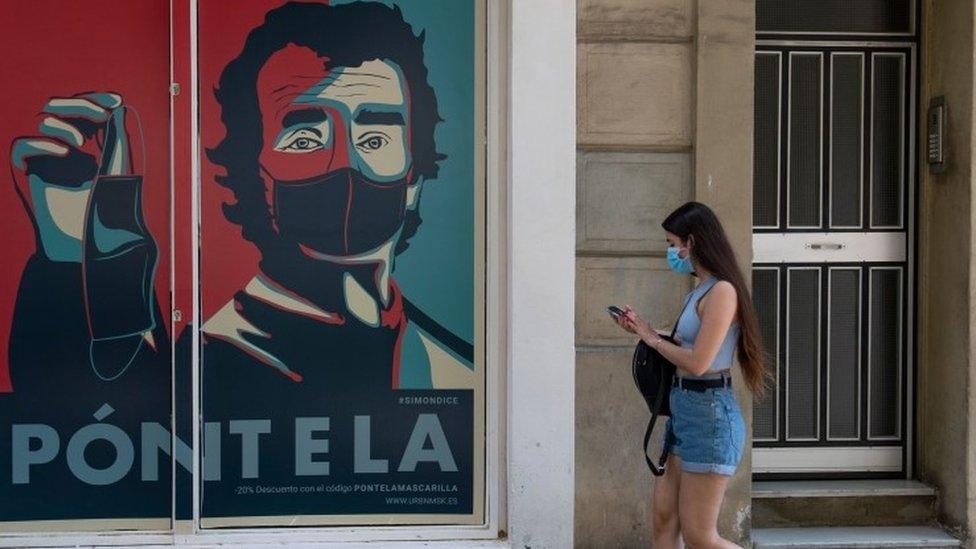Coronavirus: Spain races to save tourism as cases surge
- Published
- comments
Passengers about to return to the UK from Madrid Airport spoke of their frustration
Spain is fighting to save its embattled tourism industry after the UK government imposed a 14-day quarantine on all arrivals from the country.
Spanish officials insist the virus is under control and want certain areas exempt, including the Balearic Islands.
The UK said it had no plans to change its decision, and extended its travel advice, telling nationals to avoid non-essential journeys to all of Spain.
Britons made about 18 million trips to Spain in 2019.
Junior UK health minister Helen Whately defended the quarantine decision, telling the BBC that after all the "sacrifices" made during the lockdown, the UK could not take the risk of going back to a situation of rising virus rates across the country.
Spanish PM Pedro Sánchez said on television on Monday evening that the UK's decision was "misguided" and that he would continue to try to negotiate.
Spain's rate of infection has jumped in recent days. While the outbreak remains under control in many parts of Spain, certain areas - in particular Catalonia in the north-east and the neighbouring region of Aragón - have seen a huge spike in infections.

According to the European Centre for Disease Prevention and Control (ECDC), the country recorded 39.4 cases per 100,000 inhabitants, external over the last two weeks.
The UK and neighbouring France both have a figure of 14.6 infections per 100,000 residents.
What's the latest from Spain?
Local authorities have issued stay-at-home orders for some four million residents in Catalonia, including in the regional capital Barcelona. On Monday, Catalonia's President Quim Torra said even stricter lockdown measures could be imposed if infection numbers did not improve in the next 10 days.



"We are facing the 10 most important days of summer," he said. The region recorded 5,487 infections last week compared to 3,485 the week before, Mr Torra told reporters, adding that the situation was "very critical".
But Mr Torra also assured people that the region remained safe for tourists. Speaking in English, he said that "measures had been taken" and people "can visit most of the region safely".
Spain imposed one of Europe's strictest lockdowns in March to tackle coronavirus. The tight restrictions helped curb the infection rate, but also severely damaged the economy - in particular tourism.
Tourism accounts for about 11% of the country's gross domestic product (GDP), and a huge number of visitors come from the UK.
As a result, the country has been desperate to bring back visitors to help revive struggling towns and resorts.
"I know it's hard for the many people who are on holiday in Spain," Care Minister Helen Whately said
On Monday, Tourism Minister Reyes Maroto said the government was working with UK authorities to exclude the Balearic Islands and the Canary Islands from the quarantine, as both regions have low rates of infection.
"What we'd like is for quarantines to be lifted on the islands as early as possible, and we hope it will be today rather than tomorrow," she said.
But a UK government source later told the BBC there were "no plans" to introduce air bridges with the Spanish islands to exempt them from the 14-day quarantine.
In fact, the Foreign Office toughened its travel advice. Its earlier warning against all-but-essential travel had applied only to mainland Spain, but now includes the island groups too.
Prime Minister Sánchez said decisions should be made on Spanish regions individually, according to "epidemiological criteria".
Other Spanish leaders have criticised the UK's quarantine move as disproportionate, given the low rate of infections in many areas.
Ximo Puig, leader of the Valencia region, told a local radio station that "our epidemiological data is better than the UK's", and said the quarantine order was "not justified".


Madrid's Barajas airport currently bears little resemblance to the frenzied travel hub it normally is at this time of year.
It has been quieter than usual for several months but two days after the UK implemented a new quarantine on travellers from Spain it was eerily empty.
Many check-in desks in Terminal 4, which handles most flights to and from the UK, were closed. A midday British Airways flight to London Heathrow had only a couple of dozen passengers and many of those on board were Spaniards who live and work in the UK.
Amanda Escuder-Martínez, a midwife who has to visit London each month for her work, was one of them.
She was given a special dispensation by her employer meaning she can avoid having to quarantine but said that she felt the new measure was disproportionate given the UK's own difficulties in controlling Covid-19.
"I'm not very happy about it," she said, before checking in for the flight.

How did the pandemic affect the country?
Spain was hit hard. Latest figures released on Friday show the country had confirmed 272,421 cases and 28,432 deaths, external.
There are concerns, however, that the death toll could be far higher. On Sunday, Spanish newspaper El Pais reported that the true toll could be 60% higher, external than the health ministry's figures.
Nationally, Spain only includes deaths of people who tested positive for the virus.
By including regional figures of those suspected to have Covid-19, El Pais calculated a total of 44,868 deaths. This would mean Spain has the second-highest death toll in Europe, just behind the UK, which has recorded 45,837 deaths.
Spain's health ministry has insisted that it has followed international protocols to count deaths.
Spain's king last week led tributes to health workers and Covid-19 victims

A SIMPLE GUIDE: How do I protect myself?
IMPACT: What the virus does to the body
ENDGAME: How do we get out of this mess?
WITHOUT SYMPTOMS: The mystery of 'silent spreaders'

- Published24 December 2020

- Published26 July 2020

- Published18 July 2020

- Published15 July 2020
